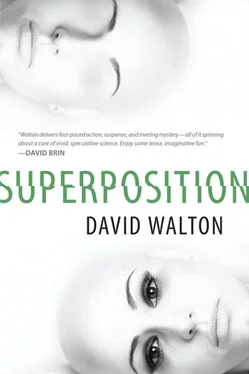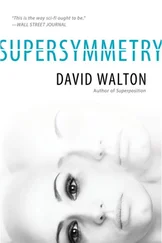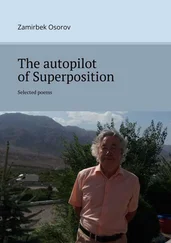“Fine,” I said, disgusted.
He climbed in the backseat again and wrapped himself with the blanket. Marek got in the passenger’s side, and I took the driver’s seat and tried the ignition. Nothing. I tried three more times, and finally the engine sputtered and caught. I backed the car away from the tree and, after spinning my tires a bit, got it back onto the road and moving forward again. I continued toward Lakehurst, though at a more careful speed. I tried my phone again. There was still no reception, but at this point, it wasn’t clear what I would tell the police anyway.
“Start talking,” I said.
“Okay,” Brian said. “You remember the nature-as-computer argument?”
I rolled my eyes. “Yes. We had this conversation already.”
“We did?”
I glanced back at him in the rearview mirror. He was wrapped up in the brown blanket so that only his eyes were showing, like an animal in a cave. “Yes. At my house. So was that thing in the bunker one of the quantum intelligences you were talking about? The oh-so-friendly fairies who gave you their technology?”
Brian looked puzzled. “When was I at your house?” he asked.
I was getting irritated. I was getting tired of being pushed around, and I wanted some answers. “You were at my house last night. You fired a gun at my wife, and I punched you. You seriously don’t remember that?”
Brian looked blank. “I haven’t been to your house in years. I wanted to come, to tell you everything, but I didn’t.”
“Okay,” I said. “Something is seriously wrong with you.”
“You’re right about the quantum intelligences,” Brian said. “Though I don’t know how you know. They’re formed from the interactions of the subatomic world, life springing out of complexity. That’s what you saw.”
“I know what I saw,” Marek said. “It was a varcolac . My grandmother saw one when she was a girl.”
“What’s a varcolac?” I asked, mauling the pronunciation.
“A demon. A monster. They live on the other side of the world,” Marek said.
“New Zealanders live on the other side of the world,” Brian said.
“No, not like that. On the other earth, the mirror world, on the other side of ours. There are the gentle folk, the blajini , who fast all year and benefit humankind, though they don’t understand us. Then there are the varcolaci , who devour and kill.”
I raised my eyebrows. “You think the thing we saw in the bunker was a monster from some kind of Romanian myth?”
“Some say they are the souls of unbaptized children,” Marek said. “Others say they are the spirits of those who drowned after Moses commanded the Red Sea to flow back over their heads. But they exist.”
“So… Egyptian monsters from a Romanian myth about a Jewish fable,” Brian said. He gave a derisive laugh. “Listen to me. This isn’t story time. We’re talking about self-aware intelligences generated from the complexity of particle interaction on a large scale.”
Marek twisted around in his seat to face Brian. “You think using scientific words changes what it is?”
“I’m talking about something physical, not a spirit.”
“I hear what you’re saying. You’re saying that if a thing is complicated enough, it will be conscious,” Marek said.
“Pretty much,” Brian said. “If it’s a network, like a brain or computer, with a means of passing information. People tend to romanticize consciousness, as if it’s something spiritual. It’s just a word we use to describe complexity.”
Marek looked at me. “This is why I hate scientists,” he said.
I grinned. “I’m a scientist.”
“Not like that. Why is calling them quantum intelligences any better than calling them varcolaci ?”
“Look, I’ll step you through it,” Brian said. “Is a toaster conscious?”
“No,” Marek said.
“Why not?”
“It’s a machine. It does what it was built to do,” Marek said.
“What about one of those automated lawn mowers or vacuum cleaners? We say things like, ‘It tried to go around the tree, but it got confused.’ Doesn’t that indicate a consciousness? That it consciously intends to mow the lawn?”
“It’s still just a machine. It follows its programming,” Marek said.
“What about a dog? Is it conscious? Does it intend to get in the lawnmower’s way, or chase the cat, or shed on the carpet? Or is it just following its programming?”
“A dog is conscious, I think,” Marek said.
“Or do we just say that, because the dog’s programming is more complex, and we can’t always predict it?” Brian asked. “What about you? I grant you the label of conscious because I ascribe intent and unpredictability to your actions, but when it comes down to it, you’re just following your programming, too. Consciousness is just when that programming becomes complex enough to warrant using a certain vocabulary.”
Marek’s hand darted into the backseat, quick as a snake, and grabbed Brian by the neck, just under his chin. I could only see him through the mirror, but I could tell Brian hadn’t seen it coming. His mouth slammed shut and his eyes bulged.
“Is it just my programming if I break your neck?” Marek asked.
I knew Marek well enough by now to know that he wouldn’t really do it, but Brian didn’t. “There’s no need for that,” he croaked.
Marek made a deep sound in his throat that eventually became recognizable as a chuckle. He let go of Brian’s throat and began to laugh heartily. Brian laughed, too, though not very convincingly, and rubbed at his throat.
“Free will is real,” Marek said. “I can choose to break your neck if I wish.”
“Science says not,” Brian said. “Everything you do is just the accumulated result of a series of probabilistic outcomes.”
“But I can decide. I haven’t decided yet, but really, it could go either way,” Marek said.
The superior grin flashed back onto Brian’s face. “In fact, it goes both ways. Every decision you make is made the other way by another version of you in a parallel universe.”
“We don’t really know that,” I put in.
“It’s basic mathematics,” Brian said, pouting now that I hadn’t backed him up. “Say the number of particles making up the Earth and its environment in space is N. Each particle can only have a finite set of values—position, velocity, spin, etc.—so the number of possible states that a set of N particles can be in is another number, M. M is staggeringly large, but finite. In an infinite universe—which ours assuredly is, or is so vast as to make the difference unimportant—those M states will all occur, and all be repeated, again and again. Not to mention all of the other infinitely sized bubble universes. Everything you do is being repeated by someone exactly like you—millions of yous, in fact—in every possible slight variation.”
Marek made a disgusted look. “A person is not the same as a toaster. If you don’t know that, your science is worth nothing.”
Brian held his hands protectively over his throat, but he kept talking. “We want to believe we’re special. But every great scientific discovery in the past has had to break us of the idea of how special and different we are as humans. Copernicus made us give up the idea that the Earth was the center of the universe. Darwin made us give up the idea that humans are greater than animals. Einstein made us realize that even our perspective on motion and time is not absolute.
“Quantum mechanics is the worst, though. It undermines our sense of purpose. It tells us that everything is driven by probabilities, the random dice roll of a billion particles. Every decision you think you make is in fact a rolling probability wave, the result of a giant quantum computer that’s calculating you and everything else. Worse, the opposite of every decision you make is probably being made by a parallel you in another universe. Einstein didn’t want to believe it either, but science doesn’t lie.”
Читать дальше












